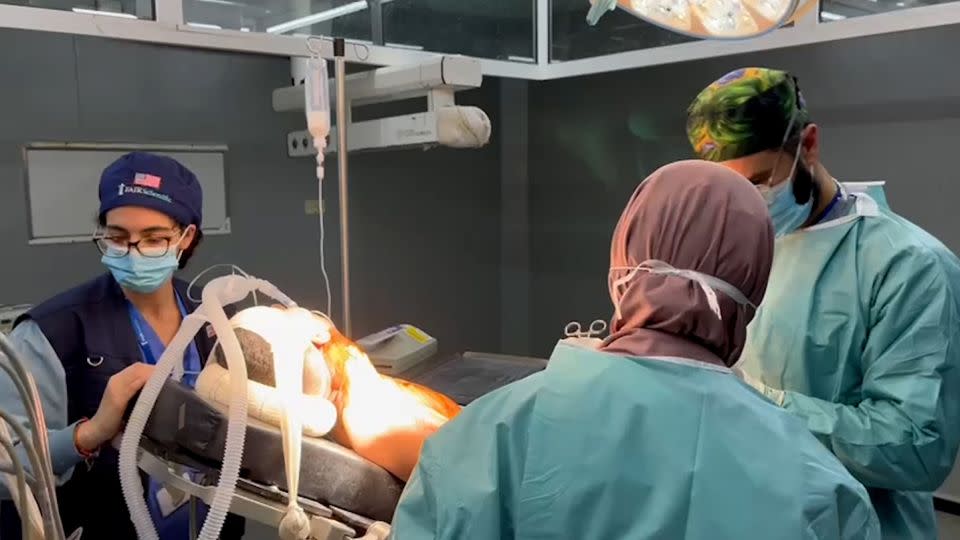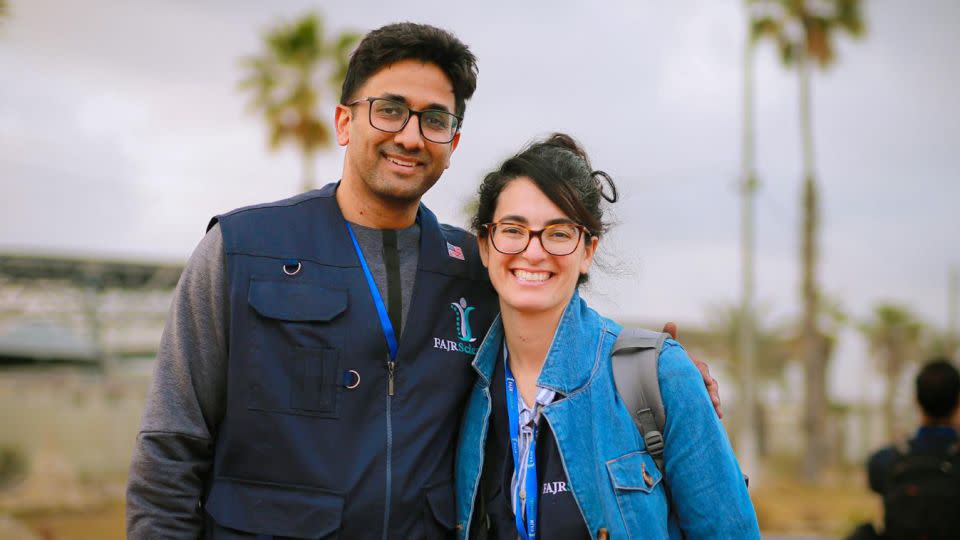American medics trapped in Gaza call on US government to help bring them home
Dr. Ahlia Kattan should already be back home in California with her three young children.
Instead, she’s spending her days and nights at Gaza’s European Hospital on the outskirts of Rafah.
Kattan, an anesthesiologist and specialist in critical care, is one of at least 22 American physicians trapped in Gaza after an Israeli military offensive in Rafah last week shuttered the city’s critical border crossing to Egypt. Rafah had, until then, served as the only entry and exit point for foreign aid workers into and out of Gaza.
“My kids have already been texting me today saying, you said Tuesday that you were going to be home,” Kattan told CNN. “The WHO (World Health Organization) is trying to negotiate a safe exit for us. And it’s not happening.”
The crossing has been closed since the Israeli military seized it early last week. Israeli and Egyptian officials have so far failed to reach an agreement on reopening it, instead trading blame for its continued closure. Meanwhile, dozens of foreign doctors are stuck in Gaza, while others are unable to get in as humanitarian conditions worsen inside the besieged enclave.
FAJR Scientific, the United States-based nonprofit organization that brought Kattan and 16 other physicians to Gaza, is now calling on the US government to help coordinate the team’s safe exit from Gaza. They had been due to leave on Monday.
“I am asking the US government to step in and coordinate with the WHO to protect US citizens trapped in a war zone and bring them home ASAP,” said Mosab Nasser, the organization’s chief executive, who is also in Gaza.

At least one member of the team requires evacuation on medical grounds, he added. The 17 medics include 12 American citizens, three UK citizens, one Omani and one Egyptian.
Kattan and her husband, who is also an anesthesiologist, arrived in Gaza more than two weeks ago, driven by the helplessness they felt watching the suffering in Gaza on television and knowing they could help.
“We knew that anesthesiologists were needed for the civilians here, the women and the children. And we knew we had something we could offer,” said Kattan.
‘This is what clean looks like in Gaza’
The FAJR Scientific team recorded video diaries of their experiences and the conditions they face inside the European Hospital exclusively for CNN.
In one video, Laura Swoboda, a nurse practitioner and wound specialist from Wisconsin, describes the buzz of drones overhead. “Even in moments where we feel safe, the war is going on, and there’s the potential for violence to resume,” she says.
The dangerous conditions aren’t only to be found outside the hospital.
“We were not aware of how dire the situation is here. There wasn’t soap to wash our hands between infected wounds with maggots. There wasn’t sanitizer wipes to wipe down the tables after each patient,” Swoboda told CNN in a Zoom interview.
“People were just coming in, person after person after person. We’re out of gauze to clean the wounds. We’re out of advanced dressings, we went through all of our cleansers, we’re using whatever we can get our hands on at this point.”
“This is what clean looks like in Gaza,” says Kattan in a clip showing the state of an operating room, with plastic overalls strewn atop the operating table.
Ahead of an operation to revise the amputations of a quadruple-amputee, Kattan details the lack of anesthetics. Picking up a single vial of Propofol, she describes how the medics were able bring it in with them from the US.

No way out
FAJR Scientific operates under the umbrella of WHO which, according to FAJR Scientific, has been attempting to coordinate an evacuation.
At least one other international medical mission is currently at the European Hospital, organized by the Palestine American Medical Association. Of the 19 members on the PAMA medical team, 10 are US citizens.
The volunteers on the FAJR Scientific mission all knew the risks involved in traveling to a war zone, said Kattan, but getting stuck in Gaza was not a scenario they had contemplated.
Now, she is torn between the desire to get back home to her children and the guilt she feels for trying to leave Gaza at a time when the Israeli military could widen its offensive and the need for medical personnel is expected to rise.
“It’s just missing my kids and waking up in the morning and realizing they’re not next to me. But the harder part is knowing that I get to leave eventually. And I get to go home and be safe. And I know that my kids are safe,” she said.
“And I’ve developed a lot of friends here who are the same age as me and have kids my age and they don’t have those securities and those basic necessities.”
After more than two weeks of witnessing the enormous strain on one of the last hospitals still in operation in southern Gaza, Kattan added that she and her colleagues only want to leave Gaza if they can be replaced by other physicians.
“We are mothers and fathers who want to be home with their families, and sons and daughters, we are physicians here, and we have colleagues and we can’t abandon them.”
For more CNN news and newsletters create an account at CNN.com


